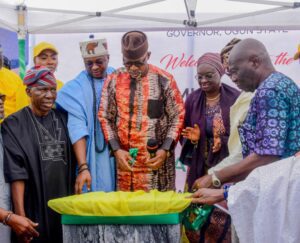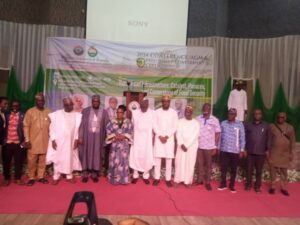
Kerosene utilisation to be eliminated in Nigeria by 2030 — Buhari
…Applauds CBN, NDIC for financial sector stability
The Federal Government plans to eliminate kerosene lighting in the country by 2030, President Muhammadu Buhari, has revealed.
This was contained in a goodwill message read on his behalf by the Minister of Finance, Budget and National Planning, Mrs. Zainab Ahmed, at the opening of the Annual Conference of the Chartered Institute of Bankers of Nigeria (CIBN), in Abuja yesterday.
According to him, the plan was meant to address the global problem of climate change.
He said, “Long-term Greenhouse emissions have resulted in hotter temperatures, more severe rainstorms, increased drought and food security issues.
“To tackle this issue, the government has set plans in motion to significantly reduce greenhouse emissions from Nigeria. More specifically, by 2030 we aim to eliminate kerosene lighting as well as short-lived pollutants in the oil & gas sector.”
Mr President who commended the Central Bank of Nigeria (CBN) and the Nigeria Deposit Insurance Corporation (NDIC) for the nation’s financial sector stability, urged the industry to reposition itself for the critical roles necessary to enable Nigerians take advantage of the African Continental Free Trade Agreement (AfCFTA).
President Buhari appealed to all Nigerians to support the administration in tackling terrorism and banditry in the country.
His words, “I emphasize that we need a Nigeria of the future that harnesses her strengths, competences, and cultural diversity to tackle the challenges that plague her people, from climate change to pandemics, and insecurity.
Banks should look inwards – Union Bank Chair, Gumel
In his keynote address, the Chairman of Union Bank, Mr. Farouk Gumel, urged Nigerian banks to look inwards, in as much as, they might be players on the global scene.
His words, “To reposition for a global context, we also need to look inwards. It is to our peril to lose the local element of what it means to be local.
“This is a country of contrasts. In some respects, Lagos may have as much as London as it does with Langtang in Plateau State.But Nigeria is not a single humongous market. It is made up of many markets. We must adapt ourselves to what works for customers, wherever they are. I will challenge the institute to publish the results of the study that shows the fastest growing retail bank in Kastina and compare that to Calabar; or the most trusted bank in Yola and compare that with Yenagoa.
“After we have seen the data, let us understand why that is so. We have often been reminded of the huge number of Nigerians who still don’t have bank accounts. That is the latest tribe- now called the unbanked tribe.
“The World Bank recently said that there are 64 million unbanked adults in Nigeria. That is 55 per cent of the adult population in this country.It is nearly the entire population of the United Kingdom. Imagine a country of that size with no bank accounts.Not even mobile bank accounts.That is what we have in Nigeria today.
“A major concern is the disproportional progress recorded.Research shows that rural population, women at least, are the least impacted by financial inclusion programmes. Those unbanked Nigerians are not only potential savers and borrowers but with our help, these are entrepreneurs and founders of businesses in the future.”
Mr. Gumel urged banks to open rural branches and be closer to the rural dwellers, who form the bulk of the Nigerian population.
Fielding questions on how to reach the unbanked in the rural areas, he said, “I think more physical presence. There is a lot of talk about, ‘we need to close down branches; we need to be more efficient’. I think it is about re-branching. You don’t need a very big branch. You just need rural branches that target rural people.
“You have to be honest to somebody to be able to convince him to trust you. That is how the banking sector should look at it.”
The CIBN President, Dr. Ken Opara, in his address said, “As the world continues to evolve, the financial services industry will need to explore innovation and reconfigure its business and operating platforms, in some cases it would require making profound changes to succeed in the future.”



